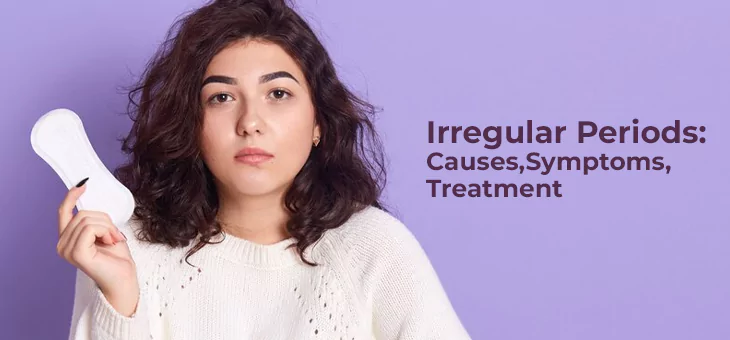The normal menstrual cycle for women can be of 28 days, but it does vary between individuals. Its called an irregular period if the cycle length is of over 35 days or there is variation observed in duration. Periods usually begin from age 10 to 16 and continue until the menopause occurs from age 45 to 55 years.
The medical term for irregular periods is oligomenorrhea. This can happen if you have changed the contraception method, there are some hormonal changes around menopause, hormonal imbalances, or with endurance exercise. Most of the time the irregularities during menopause or puberty don't need treatment, but if there are irregular periods in the reproductive age one might need medical advice.
What are the Symptoms of Irregular Periods?
There is a predictable pattern followed in women's cycle during menstruation. The cycle for most women is about 28 days. But it can vary between 25 to 35 days for an individual. Bleeding can also last from 3 to 7 days. During puberty as periods start, it can take about 2 years to get adjusted for periods to get regular.
However the duration between periods when varies with every cycle can be called an irregular period. One of the main symptoms is the cycle duration of more than 35 days or if the length varies. In case the blood low changes or there are clots observed that are of over 2.5 cms the periods are considered irregular.
What are the causes of Irregular periods?
Several factors increase the probability of irregular periods. Most of these are related to hormone production. The two important hormones here are progesterone and estrogen.
1. Hormonal impact
The life cycle influences hormonal balance in the body. These stages are:
i) Puberty:
Several years it can take for progesterone and estrogen to get balanced. Irregular periods are common in these times.
ii) Before Menopause:
When a year has passed without a period it's called Menopause. Women no longer have periods once this happens.
iii) Pregnancy:
Menstruation ceases at the time of pregnancy. Aldo most women don't have periods while they are breastfeeding.
iV) Contraceptive Use:
Irregular bleeding can be caused by contraceptives as well. IUD may cause heavy bleeding and contraceptive pills can lead to spotting between the periods.
Some of the other changes associated with irregular periods are:
• Weight gain or weight loss
• Emotional stress.
• Eating disorders like bulimia and anorexia.
• Some endurance exercises like marathon runners.
2. Complications
Irregular periods can also be due to some health problems. These can further lead to fertility issues as well. We discuss the major ones right here:
i) PCOS:
This is the health condition where several sacs that are filled with fluid develop on ovaries and called cysts. The male sex hormones are high at these times and ovulation doesn't take place. This can lead to irregular periods, acne, and obesity.
ii) Thyroid disorder:
Irregular periods can be caused because of a thyroid disorder. The thyroid gland produces hormones that can affect the metabolism of the body.
3. Uterine or cervical cancer
In some rare cases bleeding might occur between periods or at the time of sexual intercourse.
Apart from these complications there are conditions like endometriosis and Pelvic Inflammatory diseases that can cause irregular periods.
What are the treatment options available?
The treatment completely depends on the cause of irregular periods. So get checked and diagnosed by your doctor. As we already mentioned that puberty and menopause don't require any treatment most of the time.
1. In case this has occurred due to the contraception method, you can talk to your doctor about other options.
2. Obesity and PCOS need healthy lifestyle changes.
3. Treatment of underlying issues like thyroid needs prescription medicines.
4. For any kind of eating or stress disorder psychological therapy will be helpful.
Alternatively your doctor can prescribe you medicine for regulating the periods. These can be metformin or low dosage of contraceptive pills for regulating the cycles.
Conclusion
There can be so many reasons for irregular periods. If you are too concerned, it's best to consult a doctor for a proper diagnosis. Also in cases related to infertility, the earlier you seek medical care the better your chances get for an effective treatment.


